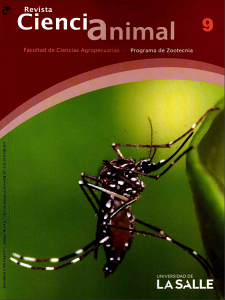Abstract
Biomass production (kg·Ha-1) and the quality of Cynodon plectostachyus-Leucaena leucocephala (ACL) association, alone or supplemented with silage (60% sugarcane and 40% pig manure enriched with vitafert), was evaluated. Additionally, weight gain was assessed in 7 crossed animals, 272 ± 15 kg, per treatment, every forty days, as well as the production of methane (CH4) in 3 randomly chosen animals per treatment two consecutive times. Four treatments were assigned to plots of land of one hectare: a) monoculture of Cynodon plectostachyus; b) association of ACL without supplement; c) ACL plus 1 kg/A/day supplement; d) ACL plus 2 kg/A/day supplement. The research was conducted on farms and in the laboratories of the University of Caldas and the data were analyzed with Stata®. Significant effect (p ≤ 0.05) of the treatment on the production of biomass was observed, as well as on the levels of crude protein, total fat, neutral detergent fiber, acid detergent fiber, total ash, calcium, magnesium, iron and manganese, and on CH4 production. Monoculture showed greater quantity and lower quality of biomass, as well as lower weight gain and greater CH4 production. Based on CH4 production, the best treatment was ACL supplemented with 1 kg of silage, which would convert a highly polluting component (pig manure) into a high quality food supplement for ruminants.Downloads
Download data is not yet available.



